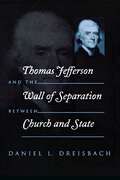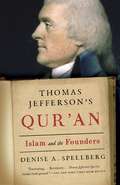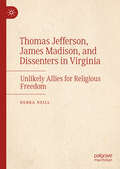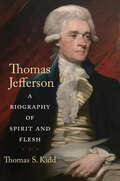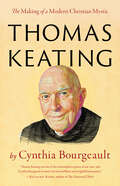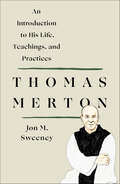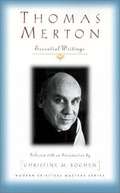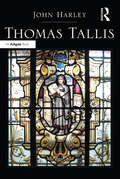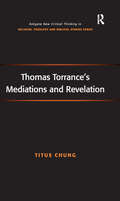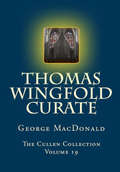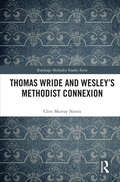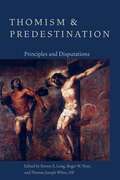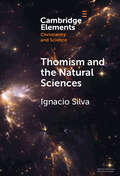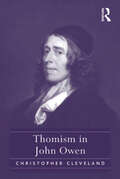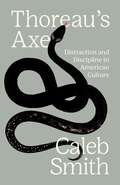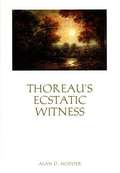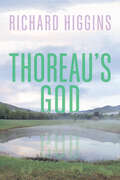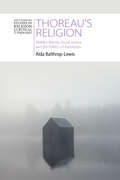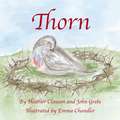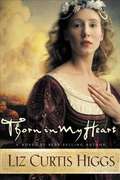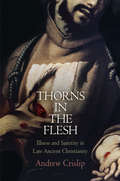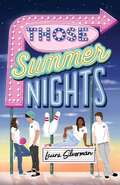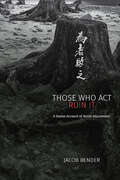- Table View
- List View
Thomas Jefferson and the Wall of Separation Between Church and State (Critical America)
by Daniel DreisbachThe origins, controversies, and competing interpretations of the famous phrase: &“A welcome and much-needed addition to [First Amendment] scholarship.&” —Journal of Interdisciplinary Studies No phrase in American letters has had a more profound influence on church-state law, policy, and discourse than Thomas Jefferson&’s &“wall of separation between church and state,&” and few metaphors have provoked more passionate debate. Introduced in an 1802 letter to the Danbury, Connecticut Baptist Association, Jefferson&’s &“wall&” is accepted by many Americans as a concise description of the U.S. Constitution&’s church-state arrangement and conceived as a virtual rule of constitutional law. Despite the enormous influence of the &“wall&” metaphor, almost no scholarship has investigated the text of the Danbury letter, the context in which it was written, or Jefferson&’s understanding of his famous phrase. This book offers an in-depth examination of the origins, controversial uses, and competing interpretations of this powerful metaphor in law and public policy.
Thomas Jefferson's Qur'an: Islam and the Founders
by Denise A. SpellbergIn this original and illuminating book, Denise A. Spellberg reveals a little-known but crucial dimension of the story of American religious freedom--a drama in which Islam played a surprising role. In 1765, eleven years before composing the Declaration of Independence, Thomas Jefferson bought a Qur'an. This marked only the beginning of his lifelong interest in Islam, and he would go on to acquire numerous books on Middle Eastern languages, history, and travel, taking extensive notes on Islam as it relates to English common law. Jefferson sought to understand Islam notwithstanding his personal disdain for the faith, a sentiment prevalent among his Protestant contemporaries in England and America. But unlike most of them, by 1776 Jefferson could imagine Muslims as future citizens of his new country. Based on groundbreaking research, Spellberg compellingly recounts how a handful of the Founders, Jefferson foremost among them, drew upon Enlightenment ideas about the toleration of Muslims (then deemed the ultimate outsiders in Western society) to fashion out of what had been a purely speculative debate a practical foundation for governance in America. In this way, Muslims, who were not even known to exist in the colonies, became the imaginary outer limit for an unprecedented, uniquely American religious pluralism that would also encompass the actual despised minorities of Jews and Catholics. The rancorous public dispute concerning the inclusion of Muslims, for which principle Jefferson's political foes would vilify him to the end of his life, thus became decisive in the Founders' ultimate judgment not to establish a Protestant nation, as they might well have done. As popular suspicions about Islam persist and the numbers of American Muslim citizenry grow into the millions, Spellberg's revelatory understanding of this radical notion of the Founders is more urgent than ever. Thomas Jefferson's Qur'an is a timely look at the ideals that existed at our country's creation, and their fundamental implications for our present and future.
Thomas Jefferson, James Madison, and Dissenters in Virginia: Unlikely Allies for Religious Freedom
by Debra NeillThis book follows the campaign to disestablish religion in Virginia from 1776 to 1786, when Thomas Jefferson&’s bill to establish religious freedom was passed. This volume seeks to tell the story of Jefferson and James Madison&’s collaboration with Virginia&’s religious dissenters; in doing so, Neill works to understand why religion was disestablished in Virginia. Neill argues that despite their religious differences these unlikely allies shared a basic understanding of what religious freedom meant and how best to secure it: by severing the ties between church and state.
Thomas Jefferson: A Biography of Spirit and Flesh
by Thomas S. KiddA revelatory new biography of Thomas Jefferson, focusing on his ethical and spiritual life “Set aside everything you think you know about Thomas Jefferson and religion, and read this book. This is the definitive account. It is well written, well researched, judicious, and entirely convincing.”—Timothy Larsen, Wheaton College Thomas Jefferson was arguably the most brilliant and inspiring political writer in American history. But the ethical realities of his personal life and political career did not live up to his soaring rhetoric. Indeed, three tensions defined Jefferson’s moral life: democracy versus slavery, republican virtue versus dissolute consumption, and veneration for Jesus versus skepticism about Christianity. In this book Thomas S. Kidd tells the story of Jefferson’s ethical life through the lens of these tensions, including an unapologetic focus on the issue where Jefferson’s idealistic philosophy and lived reality clashed most obviously: his sexual relationship with his enslaved woman Sally Hemings. In doing so, he offers a unique perspective on one of American history’s most studied figures.
Thomas K. Beecher: Minister to a Changing America
by Myra C. GlennOne of a series entitled Contributions to the Study of Religion
Thomas Keating: The Making of a Modern Christian Mystic
by Cynthia BourgeaultThe first portrait of spiritual luminary Thomas Keating&’s remarkable evolution, in the last decades of his life, into a fully realized modern-day Christian mystic.In the first four decades of his life as a Trappist monk, Thomas Keating created a comprehensive, unified psychospiritual pathway leading from healing to holiness and from contemporary psychological wellness to classic mystical sanctity and beatitude. As one of the key innovators of the meditative practice of Centering Prayer, he fashioned a powerful on-ramp to the Christian contemplative tradition. Yet, as beloved author and Keating disciple Cynthia Bourgeault shows, that was not the end of Keating&’s story—his evolution as a spiritual thinker and mystic continued in ways few have explored in depth. In this unique blend of biography, personal experience, and close reading of his late works, Bourgeault illuminates Keating&’s remarkable spiritual development from the late 1980s until his death in 2018. She explores: Keating&’s increasing engagement with nondual spiritual practice His contributions to interspiritual dialogue The evolution of his early teaching on the movement from &“false self&” to &“true self,&” to that from &“true self&” to &“no self&” His final &“dark night of the spirit&” and passage through death New evidence that he never left Christianity but carried it with him to new places These profound final stages of Keating&’s spiritual journey demonstrate how readers might find their own way as modern mystics, fundamentally at home and at peace in the universe.
Thomas Merton: An Introduction to His Life, Teachings, and Practices
by Jon M. SweeneyAn introduction to the spiritual legacy of Thomas Merton Thomas Merton was a Trappist monk and one of the most influential spiritual figures of the 20th century. His writing on contemplation, monastic life, mysticism, poetry, and social issues have influenced generations and his legacy of interfaith understanding and social justice endures to this day. Thomas Merton: An Introduction to His Life, Teachings, and Practices offers an exploration of Merton as a monk, as a writer, and as a human being. Author Jon M. Sweeney delves into Merton’s life and ideas with an appreciation for his work and a deep understanding of the spiritual depth that it contains.Thomas Merton offers a unique view of the popular and sometimes controversial monk, braiding together his thoughts and practices with the reality of his life to create a full portrait of a pivotal figure. The Merton revealed in its pages is a source of inspiration and insight for those wrestling with questions of faith and spirituality. At its core, the book is about the search for wholeness—a search Merton undertook himself throughout his lifetime and one readers can also embark on as they draw inspiration and guidance from his life.
Thomas Merton: Essential Writings
by Thomas Merton Christine M. BochenWith a substantial introduction Thomas Merton includes a broad range of Merton's writings, including his letters, and highlights his threefold call: to prayer, to compassion, and to unity. It offers the essential writings of one of the greatest spiritual teachers of our time.
Thomas Tallis: His Life And Music
by John HarleyJohn Harley’s Thomas Tallis is the first full-length book to deal comprehensively with the composer’s life and works. Tallis entered the Chapel Royal in the middle of a long life, and remained there for over 40 years. During a colourful period of English history he famously served King Henry VIII and the three of Henry’s children who followed him to the throne. His importance for English music during the second half of the sixteenth century is equalled only by that of his pupil, colleague and friend William Byrd. In a series of chronological chapters, Harley describes Tallis’s career before and after he entered the Chapel. The fully considered biography is placed in the context of larger political and cultural changes of the period. Each monarch’s reign is treated with an examination of the ways in which Tallis met its particular musical needs. Consideration is given to all of Tallis’s surviving compositions, including those probably intended for patrons and amateurs beyond the court, and attention is paid to the context within which they were written. Tallis emerges as a composer whose music displays his special ability in setting words and creating ingenious musical patterns. A table places most of Tallis’s compositions in a broad chronological order.
Thomas Torrance's Mediations and Revelation (Routledge New Critical Thinking in Religion, Theology and Biblical Studies)
by Titus ChungCould a work of revelation be justified as a viable theological project today, especially in light of some modern sceptics questioning its validity as a doctrinal discipline? Engaging with the work of theologians such as Karl Barth, Paul Tillich and Colin Gunton, Chung explores and justifies revelation and mediation in the theology of T.F.Torrance and argues that Torrance’s distinctiveness is able to contribute significantly to current debate and bring a fresh perspective to the theological landscape.
Thomas Wingfold Curate (The Cullen Collection #19)
by George MacDonaldA triumphant quest for the truth. First in the Wingfold Trilogy from the 19th-century Scottish author of Paul Faber Surgeon and There and Back. The character of Thomas Wingfold is introduced in this preeminent of George MacDonald&’s English novels, a young curate suddenly brought face-to-face with the hypocrisy of having sought the pulpit as a profession rather than a spiritual calling. Wingfold&’s prayerful journey into faith highlights MacDonald&’s most powerful &“theological novel.&” We also meet the dwarf Joseph Polwarth, Wingfold&’s spiritual mentor and one of MacDonald&’s most memorable humble apologists for truth. The depth and poignancy of Wingfold&’s quest makes this 1876 publication one of MacDonald&’s best-loved works. MacDonald biographer and editor Michael Phillips ranks Thomas Wingfold Curate near the apex of MacDonald&’s corpus, among his personal favorites along with Malcolm, Sir Gibbie, and Donal Grant.
Thomas Wride and Wesley’s Methodist Connexion (Routledge Methodist Studies Series)
by Clive Murray NorrisThis book highlights the life and writings of an itinerant preacher in John Wesley’s Methodist Connexion, Thomas Wride (1733-1807). Detailed studies of such rank and file preachers are rare, as Methodist history has largely been written by and about its leadership. However, Wride’s ministry shows us that the development of this worldwide movement was more complicated and uncertain than many accounts suggest. Wride’s attitude was distinctive. He was no respecter of persons, freely criticising almost everyone he came across, and in doing so exposing debates and tensions within both Methodism and wider society. However, being so combative also led him into conflict with the very movement he sought to promote. Wride is an authentic, self-educated, and non-élite voice that illuminates important features of Eighteenth-Century life well beyond his religious activities. He sheds light on his contemporaries’ attitudes to issues such as the role of women, attitudes towards and the practice of medicine, and the experience and interpretation of dreams and supernatural occurrences. This is a detailed insight into the everyday reality of being an Eighteenth-Century Methodist minister. As such, this text will be of interest to academics working in Methodist Studies and Religious History, as well as Eighteenth-Century History more generally.
Thomism And Predestination: Principles And Disputations
by Thomas Joseph White Steven A. Long Roger W. NuttThere is perhaps no aspect of traditional Thomistic thought so contested in modern Catholic theology as the notion of predestination as presented by the classical Thomist school. What is that doctrine, and why is it so controversial? Has it been rightly understood in the context of modern debates? At the same time, the Church's traditional affirmation of a mystery of predestination is largely ignored in modern Catholic theology more generally. Why is this the case? Can a theology that emphasizes the Augustinian notion of the primacy of salvation by grace alone also forego a theology of predestination? Thomism and Predestination: Principles and Disputations considers these topics from various angles: the principles of the classical Thomistic treatment of predestination, their contested interpretation among modern theologians, examples of the doctrine as illustrated by the spiritual writings of the saints, and the challenges to Catholic theology that the Thomistic tradition continues to pose. This volume initiates readers―especially future theologians and Catholic intellectuals―to a central theme of theology that is speculatively challenging and deeply interconnected to many other elements of the faith.
Thomism and the Natural Sciences (Elements of Christianity and Science)
by Ignacio SilvaThis Element argues for a novel approach to the sciences within Thomism, namely, science-engaged Thomism, which, aligned with the recent science-engaged theology movement, asks theological and metaphysical questions that require the input of the natural sciences. Recent developments within Thomism show a new approach to the natural sciences, and, thus, the proposal is to encourage more of this discourse by portraying the differences between contemporary and past Thomism. Still, even if it takes a novel approach, science-engaged Thomism relies on a tradition of thought that possesses a vast arsenal of metaphysical tools. Thus, after presenting this approach and a concise introduction to some basic notions of Thomistic metaphysics, the Element reviews some theological and philosophical questions and their relation to the natural sciences: issues about creation, cosmology, and astrobiology, divine involvement in evolutionary biology, providence and indeterministic quantum processes, and some ideas for further development at the end.
Thomism in John Owen
by Christopher ClevelandExamining the influence of Thomas Aquinas and his followers upon the seventeenth century Puritan theologian John Owen, this book breaks new ground in exploring the impact of medieval thought upon Reformed scholasticism. Cleveland argues that Owen uses Thomistic ideas in two ways: first in an Augustinian fashion arguing against Pelagian and semi-Pelagian ideas of human independency; second in a Trinitarian fashion, with Thomistic ideas affecting the understanding of each person of the Trinity. The resulting theological formulation is strongly Western and Orthodox and provides a helpful model for theological formulation seeking to build upon a Western Christian foundation. The works of the Reformed theologian John Owen have long been admired for their depth and theological sophistication. In this book Cleveland fills a significant gap in Owen studies by pursuing a deeper understanding of the role that Thomas Aquinas and the school of thought known as Thomism played in Owen's theology, from his works on providence and salvation by the Holy Spirit to his Christological work.
Thoreau's Axe: Distraction and Discipline in American Culture
by Caleb SmithHow nineteenth-century “disciplines of attention” anticipated the contemporary concern with mindfulness and being “spiritual but not religious”Today, we’re driven to distraction, our attention overwhelmed by the many demands upon it—most of which emanate from our beeping and blinking digital devices. This may seem like a decidedly twenty-first-century problem, but, as Caleb Smith shows in this elegantly written, meditative work, distraction was also a serious concern in American culture two centuries ago. In Thoreau’s Axe, Smith explores the strange, beautiful archives of the nineteenth-century attention revival—from a Protestant minister’s warning against frivolous thoughts to Thoreau’s reflections on wakefulness at Walden Pond. Smith examines how Americans came to embrace attention, mindfulness, and other ways of being “spiritual but not religious,” and how older Christian ideas about temptation and spiritual devotion endure in our modern ideas about distraction and attention.Smith explains that nineteenth-century worries over attention developed in response to what were seen as the damaging mental effects of new technologies and economic systems. A “wandering mind,” once diagnosed, was in need of therapy or rehabilitation. Modeling his text after nineteenth-century books of devotion, Smith offers close readings of twenty-eight short passages about attention. Considering social reformers who designed moral training for the masses, religious leaders who organized Christian revivals, and spiritual seekers like Thoreau who experimented with regimens of simplified living and transcendental mysticism, Smith shows how disciplines of attention became the spiritual exercises of a distracted age.
Thoreau's Ecstatic Witness
by Alan D. Hodder"When Henry David Thoreau died in 1862, friends and admirers remembered him as an eccentric man whose outer life was continuously fed by deeper spiritual currents. But scholars have since focused almost exclusively on Thoreau's literary, political, and scientific contributions. This book offers the first in-depth study of Thoreau's religious thought and experience. In it Alan D. Hodder recovers the lost spiritual dimension of the writer's life, revealing a deeply religious man who, despite his rejection of organized religion, possessed a rich inner life, characterized by a sort of personal, experiential, nature-centered, and eclectic spirituality that finds wider expression in America today. " "At the heart of Thoreau's life were episodes of exhilaration in nature that he commonly referred to as his ecstasies. Hodder explores these representations of ecstasy throughout Thoreau's writings - from the riverside reflections of his first book through Walden and the later journals, when he conceived his journal writing as a spiritual discipline in itself and a kind of forum in which to cultivate experiences of contemplative non-attachment. In doing so, Hodder restores to our understanding the deeper spiritual dimension of Thoreau's life to which his writings everywhere bear witness. "--BOOK JACKET. Title Summary field provided by Blackwell North America, Inc. All Rights Reserved
Thoreau's God
by Richard HigginsMeditative reflections on the great spiritual seeker’s deeply felt experience of the divine. Henry David Thoreau’s spiritual life is a riddle. Thoreau’s passionate critique of formal religion is matched only by his rapturous descriptions of encounters with the divine in nature. He fled the church only to pursue a deeper communion with a presence he felt at the heart of the universe. He called this illimitable presence many names, but he often called it God. In Thoreau’s God, Richard Higgins invites seekers—religious or otherwise—to walk with the great Transcendentalist through a series of meditations on his spiritual life. Thoreau offers us no creed, but his writings encourage reflection on how to live, what to notice, and what to love. Though his quest was deeply personal, Thoreau devoted his life to communicating his experience of an infinite, wild, life-giving God. By recovering this vital thread in Thoreau’s life and work, Thoreau’s God opens the door to a new understanding of an original voice in American religion that speaks to spiritual seekers today.
Thoreau's Religion: Walden Woods, Social Justice, and the Politics of Asceticism (New Cambridge Studies in Religion and Critical Thought)
by Alda Balthrop-LewisThoreau's Religion presents a ground-breaking interpretation of Henry David Thoreau's most famous book, Walden. Rather than treating Walden Woods as a lonely wilderness, Balthrop-Lewis demonstrates that Thoreau's ascetic life was a form of religious practice dedicated to cultivating a just, multispecies community. The book makes an important contribution to scholarship in religious studies, political theory, English, environmental studies, and critical theory by offering the first sustained reading of Thoreau's religiously motivated politics. In Balthrop-Lewis's vision, practices of renunciation like Thoreau's can contribute to the reformation of social and political life. In this, the book transforms Thoreau's image, making him a vital source for a world beset by inequality and climate change. Balthrop-Lewis argues for an environmental politics in which ecological flourishing is impossible without economic and social justice.
Thorn
by John Grebe Emma Chandler Heather ClausonThorn is a bird’s-eye view of Jesus’s last week on Earth — from the triumphal entry into Jerusalem, to the death and resurrection of Christ. <P><P>Thorn adds her songs to the shouts of praise of the crowd gathered on the street as Jesus rides into Jerusalem on a donkey, and she sings songs of comfort to Jesus as he dies on the cross. <P><P>During the week, Thorn has several unique encounters with Jesus and is protected in a surprising way when threatened by a sand cat. Throughout the week, Thorn experiences personal transformation and learns to appreciate a special blessing that is passed on to her babies.
Thorn in My Heart
by Liz Curtis HiggsTwo brothers fight to claim one father’s blessing. Two sisters long to claim one man’s heart. In the autumn of 1788, amid the moors and glens of the Scottish Lowlands, two brothers and two sisters each embark on a painful journey of discovery. Jamie and Evan McKie both want their father Alec’s flocks and lands, yet only one brother will inherit Glentrool. Leana and Rose McBride both yearn to catch the eye of the same handsome lad, yet only one sister will be his bride. A thorny love triangle emerges, plagued by lies and deception, jealousy and desire, hidden secrets and broken promises. Brimming with passion and drama,Thorn in My Heartbrings the past to vibrant life, revealing spiritual truths that transcend time and penetrate the deepest places of the heart. From the Trade Paperback edition.
Thorns in the Flesh
by Andrew CrislipThe literature of late ancient Christianity is rich both in saints who lead lives of almost Edenic health and in saints who court and endure horrifying diseases. In such narratives, health and illness might signify the sanctity of the ascetic, or invite consideration of a broader theology of illness. In Thorns in the Flesh, Andrew Crislip draws on a wide range of texts from the fourth through sixth centuries that reflect persistent and contentious attempts to make sense of the illness of the ostensibly holy. These sources include Lives of Antony, Paul, Pachomius, and others; theological treatises by Basil of Caesarea and Evagrius of Pontus; and collections of correspondence from the period such as the Letters of Barsanuphius and John.Through close readings of these texts, Crislip shows how late ancient Christians complicated and critiqued hagiographical commonplaces and radically reinterpreted illness as a valuable mode for spiritual and ascetic practice. Illness need not point to sin or failure, he demonstrates, but might serve in itself as a potent form of spiritual practice that surpasses even the most strenuous of ascetic labors and opens up the sufferer to a more direct knowledge of the self and the divine. Crislip provides a fresh and nuanced look at the contentious and dynamic theology of illness that emerged in and around the ascetic and monastic cultures of the later Roman world.
Those Summer Nights
by Laura SilvermanAfter recovering from a life-changing injury, a teen girl must navigate a new summer job, an ex-best friend, and two surprisingly attractive coworkers in this romp of a rom-com for fans of Jenny Han and Siobhan Vivian.Hannah used to be all about focus, back before she shattered her ankle and her Olympic dreams in one bad soccer play. These days, she&’s all about distraction—anything to keep the painful memories of her recent past at bay, including the string of bad decisions that landed her at boarding school for a year. Enter Bonanza, the local entertainment multiplex and site of Hanna&’s summer employment. With its mini golf course, bowling alley, and arcade—not to mention her hot, flirty coworker Patrick—Bonanza seems like the perfect way to stay distracted. Until her boss announces the annual Bonanza tournament, a staff competition that brings her past Olympic nightmares crashing back into her present. On top of that, the Bonanza staff includes Brie, the ex-best friend she cut off last year, and Ethan, her brother&’s best friend who became unreasonably attractive in her year away and who accepts her, even knowing her worst secrets. Under the neon lights of Bonanza, Hannah must decide whether she can find a way to discover a new self in the midst of her old life.
Those Who Act Ruin It: A Daoist Account of Moral Attunement (SUNY series in Chinese Philosophy and Culture)
by Jacob BenderDrawing on both western and Chinese philosophy, Those Who Act Ruin It shows how Daoism presents a viable alternative to established moral theories. The Daoist, critical of the Confucian and Mohist discourses of their time, provides an account of morality that can best be understood as achieving an attunement to situations through the cultivation of habits. Furthermore, Daoism's meta-ethical insights outline how moral philosophy, when theorized in a way that ignores our fundamental interdependence, devolves into moralistic narcissism. Another way of putting this, as the Daodejing states perfectly, is that "those who act ruin it" (為者敗之). Sensitive to this problem, the Daoist account of moral attunement can ameliorate social woes and not "ruin things." In their moral attunement, Daoists can spontaneously respond to situations in ways that are sensitive to the underlying interdependence of all things.
